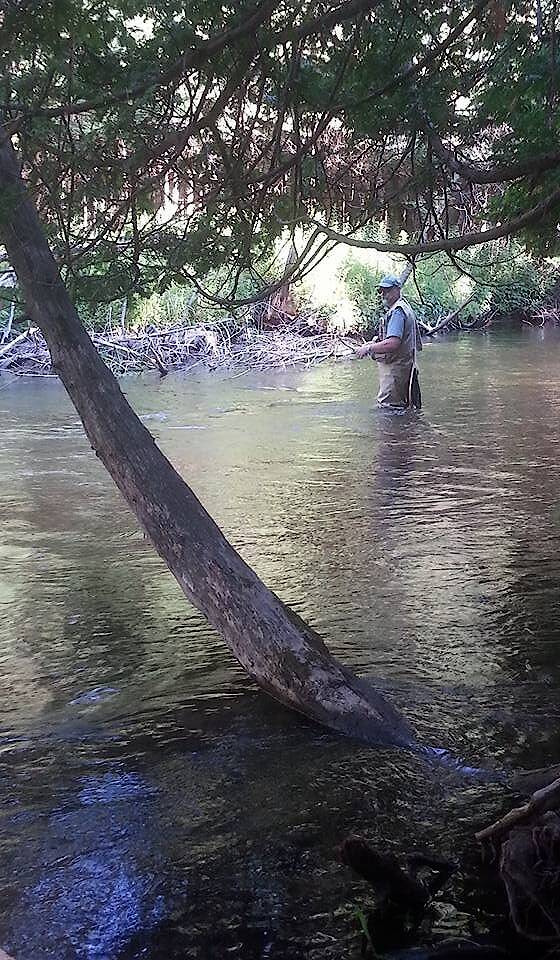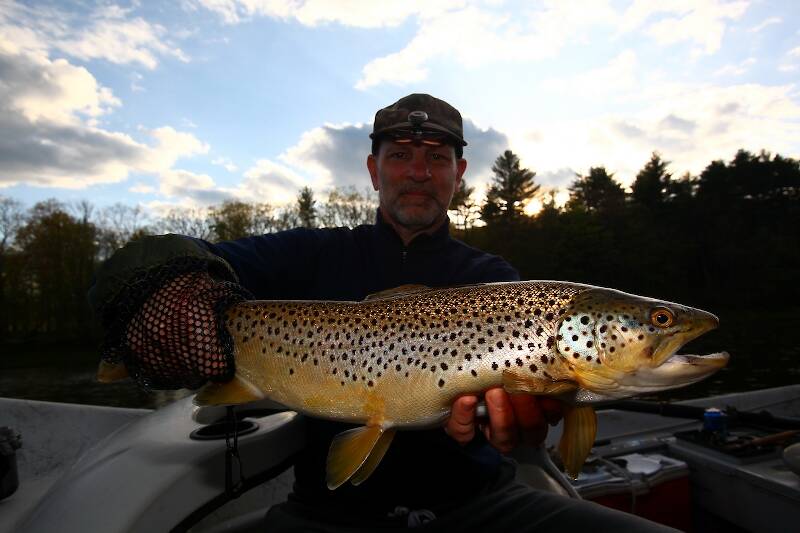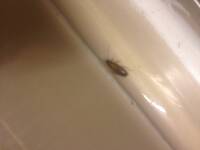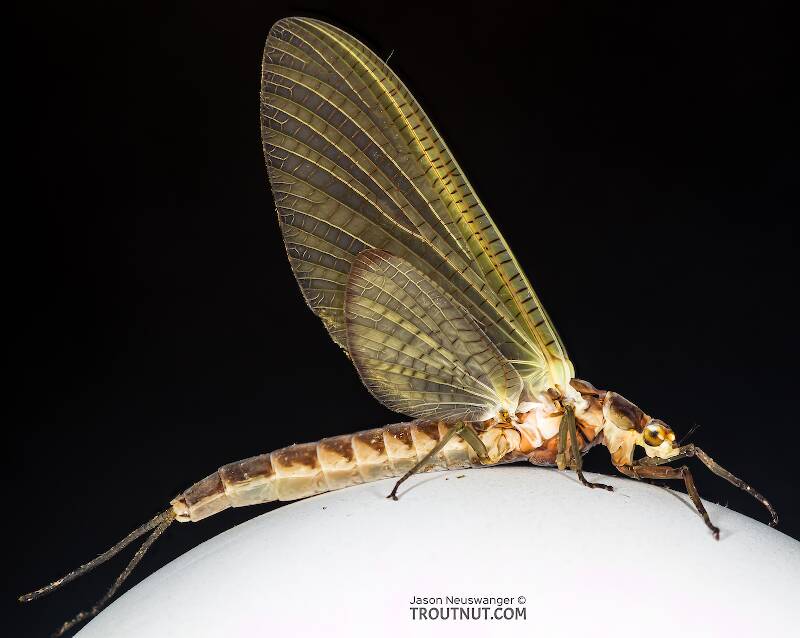
Hex Mayflies
Hexagenia limbata
The famous nocturnal Hex hatch of the Midwest (and a few other lucky locations) stirs to the surface mythically large brown trout that only touch streamers for the rest of the year.
Featured on the forum
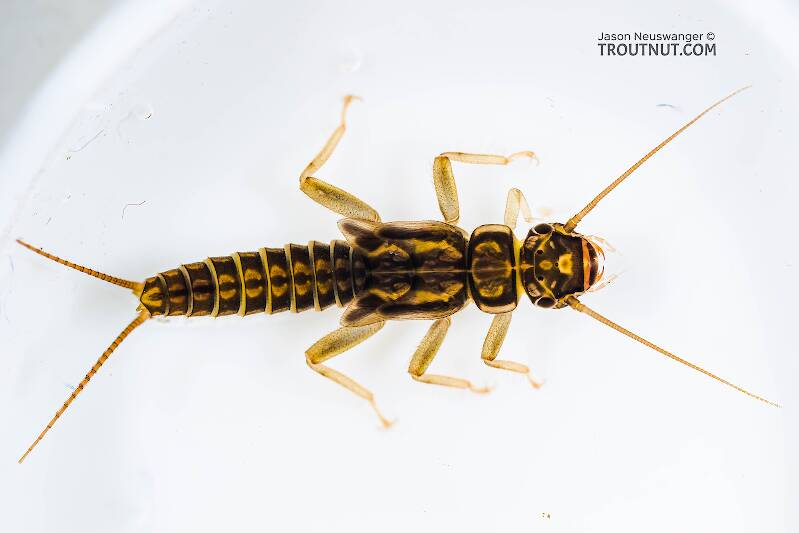

Troutnut is a project started in 2003 by salmonid ecologist Jason "Troutnut" Neuswanger to help anglers and
fly tyers unabashedly embrace the entomological side of the sport. Learn more about Troutnut or
support the project for an enhanced experience here.
Roguerat on Aug 16, 2015August 16th, 2015, 6:28 am EDT
I'm not sure where this should be posted, kind of an esoteric topic.
Does anybody have real-world experience with sun-screen or bug-spray damaging their fly-lines? I've heard quite a few anecdotal references to this happening but never from actual experience. And are there sun-screen or bug-sprays on the market that DON'T attack fly-lines? I use some pretty high DEET content bug-sprays- think of repelling black-flies or mosquitoes in Michigan's UP- and
I get concerned about line-coating effects.
Roguerat
'Less is more...'
Ludwig Mies Vande Rohe
Does anybody have real-world experience with sun-screen or bug-spray damaging their fly-lines? I've heard quite a few anecdotal references to this happening but never from actual experience. And are there sun-screen or bug-sprays on the market that DON'T attack fly-lines? I use some pretty high DEET content bug-sprays- think of repelling black-flies or mosquitoes in Michigan's UP- and
I get concerned about line-coating effects.
Roguerat
'Less is more...'
Ludwig Mies Vande Rohe
Catskilljon on Aug 16, 2015August 16th, 2015, 7:12 am EDT
I think that maybe in the 80's that could have been a problem, as I have heard the same thing. Today though, with the awareness of chemicals we ingest and put on our skin along with the modern fly line coatings I have never witnessed or damaged anything spraying myself with bug repellant.
That stuff washes off with water anyway and if there is one thing that gets wet while your fishing its your fly line!
Spray away my friend, those blackflies are the devil! CJ
That stuff washes off with water anyway and if there is one thing that gets wet while your fishing its your fly line!
Spray away my friend, those blackflies are the devil! CJ
Roguerat on Aug 16, 2015August 16th, 2015, 8:10 am EDT
Agreed on the flies...and last month I lasted all of 10 minutes on the W branch of the Fox in the UP. Mosquitoes attacked the second I left my truck and never let up until I slammed the door shut making a run for it back- but I took a dozen of the little blood-suckers with me and had to kill them while driving. The Deep-woods dope worked to keep them from biting but they still swarmed and went in the ears, up the nose, no kidding- it was bug-hell.
I know better now and will likely invest in one of those over-the-head screen things, I've heard if the mesh is sprayed with dope it's a great first line of defense.
tight lines,
Roguerat
I know better now and will likely invest in one of those over-the-head screen things, I've heard if the mesh is sprayed with dope it's a great first line of defense.
tight lines,
Roguerat
Afishinado on Aug 17, 2015August 17th, 2015, 4:19 am EDT
Deet will damage fly lines as well as many other types of PVC or plastics you touch. If you use a bug repellent with a high Deet content, be sure to wash you hands well and be careful not to get it on your line or equipment.
MiltRPowell
Posts: 106
Posts: 106
MiltRPowell on Aug 18, 2015August 18th, 2015, 6:04 pm EDT
Moving is a very funny thing. You find things thought lost long ago. Find things you have no idea you still have it. Then you find fishing shirts your aunt bought you years ago. That the cotton shirt got nasty stains from some sort of bug spray in yup, the 80's... It worked great, but a oiled sort of spray. Stained my clothes, but good.... But I do think they have come along way in bug spray since then. Things ya find when ya move. Just trips down memory lane....
I am thinking that spray, didn't do good for anything else I used also... Was something I bought in the adirondacks on a fishing trip. But worked on the bugs...
Milt...
I am thinking that spray, didn't do good for anything else I used also... Was something I bought in the adirondacks on a fishing trip. But worked on the bugs...
Milt...
flyfishingthecreekM.R.P.
RleeP on Aug 19, 2015August 19th, 2015, 12:52 pm EDT
I avoid all DEET products because it can and does dissolve or melt plastics if it comes into contact with them at sufficient concentrations. I wear 2 powerful behind the ear hearing aids and at about $2,000 apiece, I'd rather eat a bushel of blackflies or be exsanguinated by a horde of skeeters than to have to shell out four large for new aids because I got sloppy and let them come in contact with DEET.
Happily, there is (for me at least..) an effective alternative to DEET. A number of repellants have Picaridin (which does not eat plastics like DEET) as their active ingredient. When it was first approved by the FDA as a repellant, Picaridin content was limited to 7% by volume in an OTC formula. At this concentration, Picaridin was just slightly more effective than carrying a citronella candle and a rolled up newspaper. But a few years back, the FDA increased the allowed Picaridin content to 20% and at this level, its pretty good stuff.
Happily, there is (for me at least..) an effective alternative to DEET. A number of repellants have Picaridin (which does not eat plastics like DEET) as their active ingredient. When it was first approved by the FDA as a repellant, Picaridin content was limited to 7% by volume in an OTC formula. At this concentration, Picaridin was just slightly more effective than carrying a citronella candle and a rolled up newspaper. But a few years back, the FDA increased the allowed Picaridin content to 20% and at this level, its pretty good stuff.
Martinlf on Aug 27, 2015August 27th, 2015, 12:23 pm EDT
Just saw a very positive review by a flyfisher of the following:
http://allnaturalrepellent.com/prd_byebye.html
http://allnaturalrepellent.com/prd_byebye.html
"He spread them a yard and a half. 'And every one that got away is this big.'"
--Fred Chappell
--Fred Chappell
Quick Reply
Related Discussions
Topic
Replies
Last Reply
Re: Not fly fishing, but some neat winter dogsledding pictures...
In the Photography Board by Troutnut
In the Photography Board by Troutnut
3
Feb 2, 2010
by Oldredbarn
by Oldredbarn
13
Aug 25, 2010
by Shawnny3
by Shawnny3
7
Jun 10, 2009
by Troutnut
by Troutnut
8
Jul 26, 2016
by Oldredbarn
by Oldredbarn


